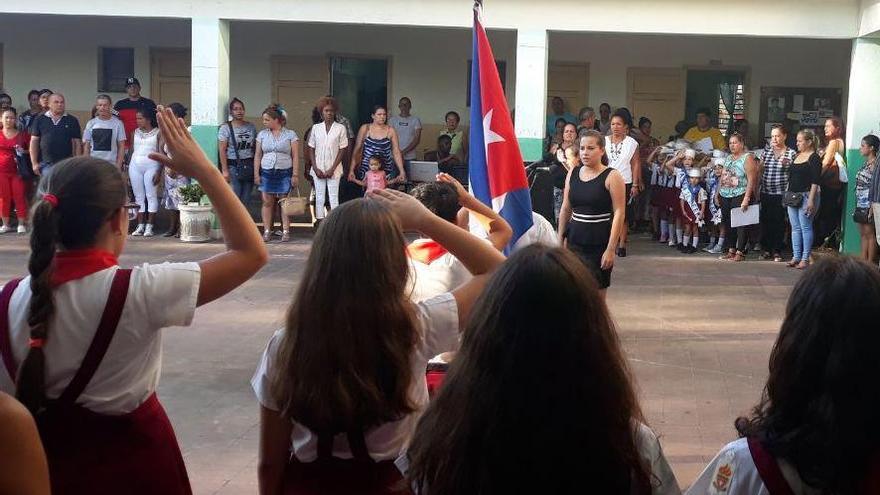
![]() 14ymedio, Ernesto Santana, Havana, May 2 2019 — There are many images of Cuba from the last 60 years that are shocking even for those who have grown up in it and should have already gotten used to it. But it is not easy to get used to those images that have something unnatural about them. One of the worst is that of primary school children who participate in acts of repudiation or in its light variant, the multitudinous political parades.
14ymedio, Ernesto Santana, Havana, May 2 2019 — There are many images of Cuba from the last 60 years that are shocking even for those who have grown up in it and should have already gotten used to it. But it is not easy to get used to those images that have something unnatural about them. One of the worst is that of primary school children who participate in acts of repudiation or in its light variant, the multitudinous political parades.
Or in a simulation of those types of marches in which the students, led by the principal and the teachers, leave the school for the street as a unit — carrying posters, disguised as workers and chanting slogans — they go around the block and they go back to school.
If one asks a ten-year-old what the Constitution is, or what the Helms-Burton Act is, what socialism or empire are, she almost most certainly has no idea or just repeats some explanatory phrase that has been instilled in her, and then continues to play without the slightest concern.
We might think that the little ones are not much affected by the incessant ideological programming, because childhood innocence is stronger than all that absurd talk. But when they grow up, the effects of long training can be seen: the double standard, learned helplessness, the Stockholm syndrome, all those Cuban ills of the last half century.
Although they don’t end up being the androids that the master plan intended them to be, at least many of them, automatons of absolute obedience, they do turn out to be fakers, who privately curse the government and then, to avoid standing out, march in the parade in the Plaza of the Revolution on May 1st.
As their teachers did in the past when they were children, the children follow their teachers without knowing the real significance of the empty words. But it doesn’t matter any more: they are words only food for being spoken, but not for being assumed. The children repeat, as their educators do, Fidel Castro’s concept of revolution as a series of confusing terms with no connection to reality.
Just words whose significance we find in no dictionary. Nobody knows what it means exactly to want to say, “change everything that should be changed,” “revolution is never lying,” or “I am Fidel.” And not even the teachers who are repeating it can rationally explain the school slogan, “Pioneers for communism, we will be like Che!”
Because you do not have to think about the meaning of any slogan. Just repeat it or carry it written on a poster. “I am Fidel” means, let’s face the contradiction, that Fidel Castro is God and therefore I can never be like him. But religious dogmas are not reasonable.
If there is a crisis of values, it does not matter. What can not be manifested is an ideological crisis. Thus, in the face of moral misery, the Government intends that the family share with the school the role of training and developing the students, even though what families and schools share most specifically is a serious lack of civility.
And yet, parents can not teach the child anything that contradicts the dogmas of the Castroite Church. In fact, instruction by the State is mandatory and parents can not educate their children at home. In Guantánamo province, a few days ago, two pastors were sentenced to prison for practicing homeschooling and acting against “the correct formation” of their children.
The Cuban educational system is not designed to train free and independent citizens, but to manufacture docile individuals. Teachers may be missing, classrooms may be very damaged and parents will have to help out the school in many aspects, but what can never fail is the revolutionary catechism and the cult of the immortal Commander in Chief.
Even when the student goes to university, and even when he graduates and practices teaching, he must continue to obey and avoid any independent attitude. The student Karla Pérez was a member of the opposition movement Somos+, and the and the teacher Dalila Rodríguez was not engaged in activism but she was the daughter of a defender religious rights, Leonardo Rodríguez Alonso and a friend of the pastor Mario Félix Lleonar.
Many years ago the writer Slawomir Mrozek published, in Communist Poland, the story “The Elephant,” about a teacher who, after explaining in detail what that animal was like, took his students to the zoo to see one face to face.
But the people in charge of the zoo — to save money and taking into account that the heavy animal moved very litte — decided to buy an inflatable one. When the students came to see a “real elephant,” suddenly the wind blew and carried the big animal across the sky as if it were a balloon. The trauma they experienced changed those children’s lives
The elementary students who performed that mockery of a march for May Day would not have been so disappointed. They already know very well that what they say and make them say in school has very little to do with reality.
_______________________
The 14ymedio team is committed to serious journalism that reflects the reality of deep Cuba. Thank you for joining us on this long road. We invite you to continue supporting us, but this time by becoming a member of 14ymedio. Together we can continue to transform journalism in Cuba.
